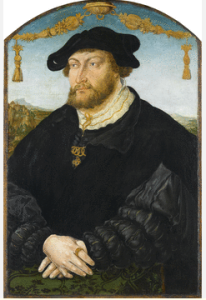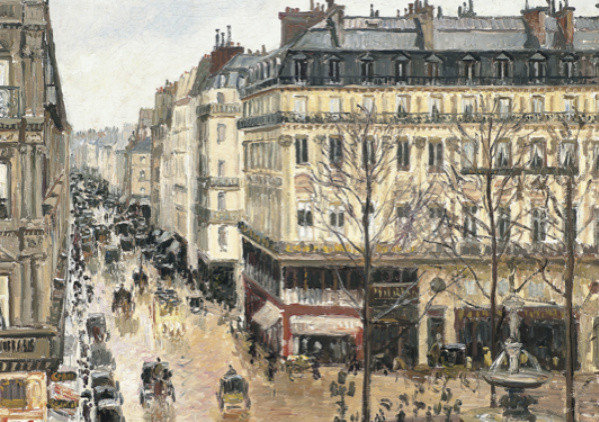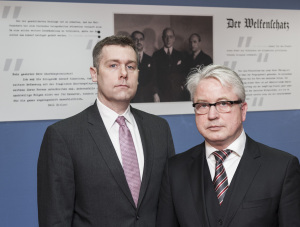The German federal cabinet has approved a revision to its cultural heritage protection law notwithstanding overwhelming opposition by essentially everyone who commented, putting the draft on the fast track to legislative enactment next year.
Despite Universal Criticism, German Cabinet Approves Stricter Cultural Heritage Law
Topics: cultural property, VAT, Georg Baselitz, Germany, Minister of Culture Monika Grütters, EU, Artforum, Kulturgutschutzgesetz, Gerhard Richter, cultural heritage protection law, Michael Werner, Welfenschatz
Holocaust Revisionism in German Motion to Dismiss Guelph Claim Elicits Condemnation
Germany Runs Counter to 20 Years of International Commitments
As readers know, my clients Alan Philipp and Gerald Stiebel sued the Federal Republic of Germany and the Stiftung Preussischer Kulturbesitz (SPK) in February for restitution of the Guelph Treasure (or Welfenschatz as it is known in Germany), assisted by my co-counsel Mel Urbach, Esq. and Markus Stötzel of Marburg, Germany. As my co-counsel speak to an event tonight hosted by Congresswoman Grace Meng on the anniversary of Kristallnacht, an event inextricable to the persecution of Jews in Europe, Germany’s response to the Complaint advances a stunning revisionism about the Holocaust and the international commitments that Germany has made. While paying lip service to the seriousness of Jewish suffering, the papers filed in court are nothing less than an attempt to move the goalposts to exempt a historical period from responsibility about which there can be no serious debate. Independent condemnation was not far behind the filing.
Topics: Grace Meng, Simon Wiesenthal Center, Shoah, Adolph von Menzel, Hans Sachs, Washington Principles on Nazi-Looted Art, 1943 London Inter-Allied Declaration, Dachau, Holocaust, Mel Urbach, SPK, George Eduard Behrens, Nuremberg race laws, Holocaust revisionism, Stiftung Preussischer Kulturbesitz, Marburg, Restitution, Los Angeles, Gerald Stiebel, World War II, Markus Stötzel, Saemy Rosenberg, Deutsches Historisches Museum, Reichskristallnacht, Isaac Rosenbaum, Lucie Ruth Hackenbroch, Federal Republic of Germany, Zacharias Hackenbroch, Pariser Wochentag, Rabbi Abraham Cooper, Paris Weekday, Alan Philipp, Welfenschatz, Military Government Law 59, Frankfurt
Staatsgalerie Stuttgart Restitutes Wertinger Painting to Rosenbaum and Rosenberg Heirs, Citing Importance of Blocked Accounts That Also Support Guelph Treasure Claim
The Staatsgalerie Stuttgart has agreed to return Bildnis Pfalzgraf Johann III (Portrait of Elector-Palatine Johann III), ca. 1526, by Hans Wertinger to the heirs of the art dealers Saemy Rosenberg and Isaak Rosenbaum, the owners of the art dealer firm I. Rosenbaum in Frankfurt. Rosenbaum and Rosenberg sold the Wertinger in 1936, but the proceeds were paid into a Nazi-blocked account. The work eventually ended up with collector Heinrich Scheufelen in 1948.
Topics: Stefan Koldehoff, Joint Declaration, Nazi-looted art, Baden-Württemberg, Washington Principles on Nazi-Looted Art, Heinrich Scheufelen, Die Bilder Sind Unter Uns, SPK, Portrait of Elector-Palatine Johann III, Stiftung Preussischer Kulturbesitz, Nazi terror, Isaak Rosenbaum, Deutschlandfunk, Restitution, coerced sale, World War II, Staatsgalerie Stuttgart, Saemy Rosenberg, Jürgen Walter, Museums, forced sale, Zacharias Hackenbroch, Bildnis Pfalzgraf Johann III, Welfenschatz, The Pictures Are Under Us, I. Rosenbaum, Frankfurt
Boston Globe Publishes Article on Welfenschatz Case
The Boston Globe published a story today entitled “Gift to Hitler spurs a claim for justice" about the Welfenschatz case that I filed for my clients earlier this year.
Topics: Gurlitt Collection, Hitler, Boston Globe, Restitution, World War II, Welfenschatz
Foreign Cultural Exchange Jurisdictional Clarification Act Returns
The U.S. House of Representatives passed yesterday H.R. 889, the Foreign Cultural Exchange Jurisdictional Clarification Act for the third time in four years. Identical bills passed the house in early 2012 and again last year but failed to win passage in the Senate and signature by the President, thus expiring without becoming a law (and remaining just a bill sitting on Capitol Hill). Will it become law? Probably not, and after a little reflection and evolution, that’s probably for the best.
Topics: U.S. House of Representatives, Foreign Cultural Exchange Jurisdictional Clarifica, Second Hickenlooper Amendment, Russia, Herrick Feinstein, Nazi-looted art, Konowaloff, Stiftung Preussischer Kulturbesitz, Association of Art Museum Directors, Restitution, World War II, Foreign Sovereign Immunities, act of state doctrine, Senate, Altmann v. Republic of Austria, Capitol Hill, Immunity from Seizure Act, Chabad, Federal Republic of Germany, 28 U.S.C. § 1605, Welfenschatz, Foreign Cultural Exchange Jurisdictional Immunity, Mari-Claudia Jiménez, Cuba
District Court Dismisses Cassirer Claim for Pissarro against Thyssen Bornemisza Collection by Applying Spanish Law of Adverse Possession
One of the longest running art restitution litigations in the United States has been dismissed for a second time, with another appeal likely to follow. The heirs of Lilly Cassirer Neubauer have been pursuing the return of Camille Pissarro’s Rue St. Honoré, après-midi, êffet de pluie from the Thyssen-Bornemisza Collection in Madrid for more than ten years, but on June 4, 2015 the U.S. District Court in Los Angeles ruled that the Spanish museum has acquired full title to the painting by adverse possession. The key aspect of the decision is the court’s resolution of the choice of law question, namely, should California law or Spanish law apply to the question of who owns the painting? After a lengthy analysis the court determined that Spanish law applies, and that the museum has possessed the painting long enough to have become the owner regardless of the fact that it was sold under duress. So now a case that has already been to the Ninth Circuit Court of Appeals twice will almost certainly head back a third time. The court concluded its decision by appealing to the parties to “pause, reflect, and consider whether it would be appropriate to work towards a mutually-agreeable resolution of this action, in light of Spain’s acceptance of the Washington Conference Principles and the Terezin Declaration, and, specifically, its commitment to achieve “just and fair solutions” for victims of Nazi persecution.” But it is hard to see why that would happen. Notwithstanding the dictates of the Washington Principles, the Collection has been quite content to resist the claim. Now that it has won, it is hard to imagine it suddenly taking a different view.
Topics: Lilly Cassirer Neubauer, Terezin Declaration, Thyssen-Bornemisza Collection, Rue St. Honoré après-midi êffet de pluie, Jacques Goudstikker, California Code of Civil Procedure § 354.3, Nazi-looted art, Foreign Sovereign Immunities Act, Washington Conference Principles, FSIA, adverse possession, expropriation exception”, Restitution, Marei Von Saher, sovereign immunity, Jakob Schweidwimmer, World War II, Foreign Sovereign Immunities, Restatement (Second) of Conflict of Laws § 222, Altmann v. Republic of Austria, Camille Pissarro, foreign affairs doctrine, Ninth Circuit Court of Appeals, Museums, Baron Hans-Heinrich Thyssen- Bornemisza, 28 U.S.C. § 1605, Welfenschatz
The Woman in Gold: Why the Altmann Case Matters
The release last week of The Woman in Gold, the feature film adaptation of The Lady in Gold by Anne Marie O’Connor, starring Helen Mirren and Ryan Reynolds as Maria Altmann and her attorney E. Randol Schoenberg, respectively, as well as Tatiana Maslany as the younger Altmann and Daniel Brühl as Austrian journalist Hubertus Czernin, is an important opportunity to reflect on the legal importance of the case. Even today, the case provides lessons about the way some victims are still treated, and how one individual can make sure the past is never forgotten. The looting of Jewish art collections was a concerted effort whose prominence should never be forgotten. And perhaps even more, it robs those who did survive of the dignity of remembering their family experiences. Consider: the next time you gather with your extended family, look around the room. Pick something that you’re accustomed to seeing when the family meets. Now, imagine it had been stolen or surrendered under duress, and was hanging on the wall of a national collection that denied it had been taken. How would you feel? This is the dilemma faced by many claimants, and it is precisely why Altmann matters so much.
Topics: Maria Altmann, The Lady in Gold, Adele Bloch-Bauer, The Woman in Gold, Daniel Brühl, Germany, Nazi-looted art, Academy of Fine Arts, Foreign Sovereign Immunities Act, Hitler, Tatiana Maslany, Anne Marie O’Connor, Supreme Court, A Few Good Men, Belvedere, E. Randol Schoenberg, World Jewish Congress, Stiftung Preussischer Kulturbesitz, Ryan Reynolds, FSIA, expropriation exception”, Restitution, Neue Galerie, World War II, Foreign Sovereign Immunities, Switzerland, Ferdinand Bloch-Bauer, Helen Mirren, Museums, Fritz Altmann, Gustav Klimt, Vienna, Welfenschatz, Hubertus Czernin, Ronald Lauder, Austrian National Gallery
Guelph Treasure Claims—Coverage and Analysis
It has been almost two weeks since I filed my clients’ claims for restitution of the Guelph Treasure (Welfenschatz).
Topics: Maria Altmann, Frankfurter Allgemeine Zeitung, National Socialists, Third Reich, artdaily.org, Reuters, United States Supreme Court, Gestapo, Haaretz, Deutschlandradio. Deutsche Presse Agentur, Robin Young, the Guardian, The Art Newspaper, Foreign Sovereign Immunities Act, The Wall Street Journal, Deutsche Welle, Santa Fe, KRQE News 13, the Observer, Markus Stoetzel, Die Erle, Mel Urbach, Nazis, Advisory Commission, 3SAT, ZDF, Stiftung Preussischer Kulturbesitz, Washington DC, Hermann Goering, Private Wealth, Restitution, Sullivan & Worcester LLP, Here & Now, Gerald Stiebel, World War II, Foreign Sovereign Immunities, flight tax, Süddeutsche Zeitung, Adolf Hitler, United States District Court, The New York Times, Federal Republic of Germany, BBC News Europe, Alan Phillip, Welfenschatz, NPR, PrivateArtInvestor, ArtNet news
Civil Action Filed Against Germany for Restitution of Guelph Treasure
I filed yesterday a new civil action against the Federal Republic of Germany and the Stiftung Preussischer Kulturbesitz (the SPK, which is responsible the administration of the Berlin museums, among other things) in the United States District Court in Washington, DC. You can read the Complaint here. The lawsuit seeks the immediate restitution to my clients of the collection held by the SPK known as the Welfenschatz, or as it is referred to in English, the Guelph Treasure. My clients Gerald Stiebel and Alan Phillip are the blood relatives and successors to the consortium of Jewish art dealers who were threatened and forced by the National Socialist government into selling the Welfenschatz in 1935.
Topics: Maria Altmann, National Socialists, Third Reich, Philipp v. Federal Republic of Germany et al. 15-c, United States Supreme Court, Gestapo, Foreign Sovereign Immunities Act, Markus Stoetzel, Mel Urbach, Nazis, Advisory Commission, Stiftung Preussischer Kulturbesitz, Washington DC, Hermann Goering, Restitution, Sullivan & Worcester LLP, Gerald Stiebel, World War II, flight tax, Adolf Hitler, United States District Court, Federal Republic of Germany, Alan Phillip, Welfenschatz
Sullivan & Worcester LLP Press Release Concerning Claims For Guelph Treasure
Topics: Maria Altmann, National Socialists, Third Reich, Philipp v. Federal Republic of Germany et al. 15-c, United States Supreme Court, Gestapo, Foreign Sovereign Immunities Act, Markus Stoetzel, Mel Urbach, Nazis, Advisory Commission, Stiftung Preussischer Kulturbesitz, Washington DC, Hermann Goering, Restitution, Sullivan & Worcester LLP, Gerald Stiebel, World War II, Foreign Sovereign Immunities, flight tax, Adolf Hitler, United States District Court, Federal Republic of Germany, Alan Phillip, Welfenschatz







